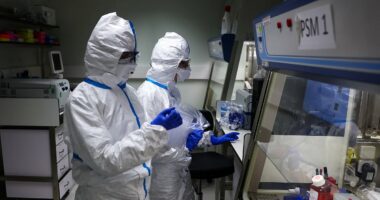Share this @internewscast.com
A family of healthy bacteria may help ‘soak up’ toxic forever chemicals in the body, warding off their cancerous effects.
Forever chemicals, also known as PFAS (per- and polyfluoroalkyl substances), are toxic chemicals that have been linked cancer, infertility and birth defects.
They’re named because they don’t naturally break down in the environment or the body.
Instead, they leech from plastic containers and nonstick cookware into food and build up in vital organs, increasing the risk of organ failure, infertility and some forms of cancer.
Researchers at the University of Cambridge took samples of 38 strains of healthy bacteria living in the human gut and put them into lab mice.
They found mice carrying human gut bacteria had up to 74 percent more ‘forever’ chemicals in their stool compared to mice without the bacteria within minutes of exposure.
This suggests the toxins latched on to the bacteria as they moved through the digestive tract, leaving the body through the stool.
While mountains of research have demonstrated deadly effects of forever chemicals, the new study is one of the first to show they can be taken out of the body instead of accumulating in there forever.
And it builds on recent research showing a link between PFAS and the digestive tract. A study published last month, for example, found PFAS latches on to bile acids in the gut and eating fiber can help filter that excess bile out.

Researchers at the University of Cambridge found nine different strains of healthy gut bacteria may lower forever chemical levels by up to 74 percent (stock image)

PFAS is a common contaminant in many household items from cookware to hamburger wrappers. It can remain in the environment as well as human tissue for years, even decades, before being cleared out
Dr Kiran Patil, senior study author and toxicologist at the University of Cambridge, said: ‘Given the scale of the problem of PFAS “forever chemicals,” particularly their effects on human health, it’s concerning that so little is being done about removing these from our bodies.
‘We found that certain species of human gut bacteria have a remarkably high capacity to soak up PFAS from their environment at a range of concentrations, and store these in clumps inside their cells.
‘Due to aggregation of PFAS in these clumps, the bacteria themselves seem protected from the toxic effects.’
PFAS are thought to be endocrine-disrupting chemicals, meaning they imitate the body’s hormones and interfere with the production of – and response to – natural hormones like estrogen and testosterone.
This increases the risk of developing hormone-sensitive cancers like breast and ovarian cancer.
The study, published Tuesday in the journal Nature Microbiology, looked at samples of 38 healthy bacteria in the gut.
The researchers measured the effect of bacteria on levels of the forever chemicals perfluorononanoic acid (PFNA) and perfluorooctanoate acid (PFOA).
PFOA is considered a Group 1 carcinogen by the International Agency for Research on Cancer (IARC), meaning it causes cancer in animals. PFNA, meanwhile, is a Group 2 carcinogen, suggesting it may cause cancer in animals.
Over the course of 24 hours, nine of the tested bacteria reduced exposure to PFNA by 25 to 74 percent and PFOA levels by 23 to 58 percent.
For both types of PFAS, Odoribacter splanchnicus lead to the greatest reductions. It’s thought to produce the short-chain fatty acid butyrate, which boosts metabolism and immune function.
The team believes PFAS latch onto the bacteria and are excreted out of the body through the stool.
The researchers are now working on developing probiotic supplements to increase levels of these healthy bacteria in the gut.
Dr Indra Roux, study co-author and researcher at the University of Cambridge’s MRC Toxicology Unit, said: ‘The reality is that PFAS are already in the environment and in our bodies, and we need to try and mitigate their impact on our health now.
‘We haven’t found a way to destroy PFAS, but our findings open the possibility of developing ways to get them out of our bodies where they do the most harm.’















